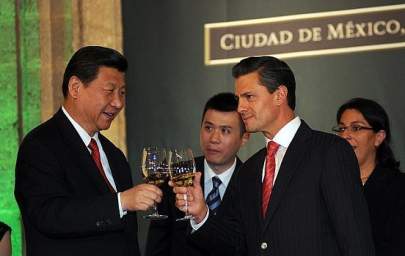China in Mexico, the growing threat!
Monday, March 27, 2023
Written by Laurence F Sanford, Senior Analyst ASCF
Categories: ASCF News ASCF Articles

China is a growing presence economically, politically, and socially in Mexico.
Fentanyl - China supplies Mexican cartels with the raw ingredients to make fentanyl and other opioid drugs for smuggling into the United States. Over 100,000 Americans died last year from drugs. The Chinese embassy in Washington D. C. writes that China has a zero-tolerance policy against drugs and to “remind the U.S. side that the root cause of its fentanyl abuse problem is in itself.” (Good point!)
China can speak from its own historical viewpoint on the dangers of drug abuse. The 1800s was the “Century of Humiliation” caused by the forced importation of opium from India into China by Great Britain and Japan. When China resisted the opium poisoning of its citizens, military engagements resulted in China losing and being forced to sign a series of unequal treaties, including conceding Hong Kong to the British and Taiwan to the Japanese. The Chinese Communist Party (CCP) has and does consistently highlight the “humiliations” and vows to correct this series of unequal treaties, such as re-uniting Taiwan.
Supplying the precursor drugs of fentanyl to Mexican drug cartels and Chinese criminal drug cartels within Mexico and Latin America is good business for the CCP as it generates billions of dollars in profit. It also serves the CCP’s war against the U.S. by weakening and killing Americans and subverting the American culture. The leading cause of death for men aged 18 to 45 is fentanyl.
Investments - China is investing billions of dollars in Mexico to gain control of natural and political resources. Unlike the United States, which often conditions development aid on adherence to Western-style democracy, China’s policy is one of “non-interference.” China does not say anything about you, and you don’t say anything about them. And the CCP is not shy about paying bribes to leading politicians, academics, and business leaders. (What else can explain Muslim countries' silence on the abuse of Muslim Uyghurs by the CCP? One person in a western country burns the Quran, and riots occur throughout the Islamic world.)
With deteriorating political relations between China and the U.S., the U.S. imposition of higher tariffs, and the banning of certain high-tech materials, Chinese companies are expanding their manufacturing facilities to Mexico to be near the U.S. market and take advantage of zero or low tariffs in the 2020 United States - Mexico - Canada Agreement (USMCA) which succeeded the North American Free Trade Agreement (NAFTA) for goods shipped from Mexico to the U.S. The manufacturing facilities with Chinese workers leads to increased Chinese political, cultural, and economic influence at the local level.
Cultural - China has invested millions in Confucius Institutes, which propagate CCP policies through alliances with Mexican universities. The Institutes teach Mandarin, finance summer camps in China, and offer scholarships for study in China. The objective is to create “a generation of future leaders who will …. support many of China’s foreign policy aims.”
The China Belt and Road Initiative (BRI) is not in effect in Mexico because it would be in violation of the USMCA, which limits Mexico’s ability to make separate trade deals. At the present time, trade with the U.S. is more important to Mexico than trade with China.
Latin America is turning red! Not only is China expanding its presence and influence, but also Russia, Cuba, and Iran. Almost all Latin American countries (LAC) are now socialist/communist, and overall trade with China has grown from $12 billion in 2000 to $315 billion in 2020.
Mexico’s President Andres Manuel Lopez Obrador is threatening to confiscate American-owned energy companies operating in Mexico. Previous privatization programs by the government are being reversed, and the nationalization of industries, especially in the energy sector, is in progress.
Summary - The United States must stop the mass migration of people and drugs into America. Our culture, prosperity, and security are at stake. We are not to send our troops into Mexico to go after the cartels - how have our past interventions worked in other countries?
Action - Secure the borders and strengthen our military capabilities by increasing the budget and eliminating Wokeness and DIE.
Peace Through Strength!
Laurence F. Sanford
American Security Council Foundation
www.ascf.us




